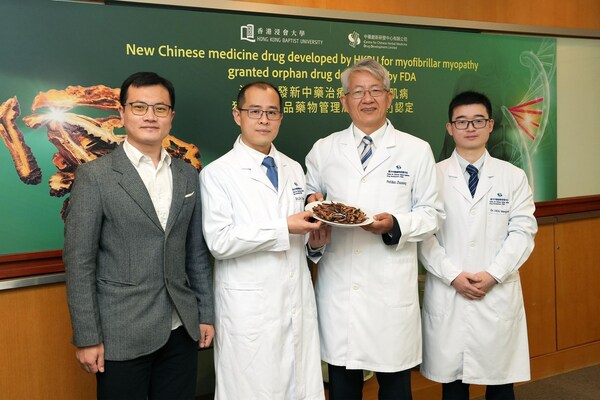HONG KONG, Jan. 10, 2024 /PRNewswire/ -- The Centre for Chinese Herbal Medicine Drug Development of Hong Kong Baptist University (HKBU) has developed a new drug using effective components of a Chinese herbal medicine, Chaenomelis Fructus, for the treatment of the rare disease, myofibrillar myopathy. The drug has obtained the orphan drug designation from the US Food and Drug Administration (FDA), and is the first botanical drug in Hong Kong to receive this qualification.

Professor Bian Zhaoxiang, Associate Vice-President (Chinese Medicine Development) and Director of the Centre for Chinese Herbal Medicine Drug Development at HKBU (2nd right); Dr Lin Chengyuan, Assistant Director (Administration) (2nd left); Dr Hou Mengyang, Postdoctoral Research Fellow (1st right); and Mr Duan Zhigang, Senior Regulatory Affairs Manager (1st left) of the Centre introduce the new drug for the treatment of myofibrillar myopathy.
Success in obtaining orphan drug (a drug used for treating rare disease) designation will accelerate the approval process of the new drug, including speeding up of the review process, waiver of the marketing authorisation fee, and seven years of market exclusivity for the approved product. The research team plans to submit an Investigational New Drug application to FDA in two years to conduct clinical trials.
Lack of effective treatment for myofibrillar myopathy
Myofibrillar myopathy, primarily caused by genetic mutations, including the BAG3 gene, is a rare hereditary neuromuscular disorder with symptoms resembling muscular dystrophy. It typically manifests during adolescence and is characterised by severe clinical symptoms, including progressive muscle weakness, muscle atrophy, motor impairment, muscle stiffness, respiratory muscle involvement, and cardiomyopathy.
Currently, there is no effective treatment for myofibrillar myopathy, and the high cost of treatment poses significant burdens for patients, their families and society. Due to the rarity of this disease, researchers are still exploring the treatment approaches for this disease and evaluating their safety and efficacy.
Focusing on myofibrillar myopathy caused by BAG3 gene mutation (Bag3opathy), the Centre for Chinese Herbal Medicine Drug Development made reference to clinical cases, integrated Chinese medicine theory with modern scientific technology, and made use of the effective components of a Chinese herbal medicine Chaenomelis Fructus to develop a new drug named CDD-2107.
New drug with effective components of Chaenomelis Fructus
The commonly used Chinese herbal medicine Chaenomelis Fructus is the dried mature fruit of Chaenomeles speciosa (Sweet) Nakai, which belongs to the Rosaceae family. It is widely used for joint and muscle disorders, such as paralysis caused by summer heat-dampness, and pain in the waist and knee joints. Though bearing very similar Chinese names, Chaenomeles speciosa is different from the fruit papaya belonging to the Carica genus of the Caricaceae family.
The research team, based on traditional Chinese medicine theory with a focus on clinical efficacy, applied modern Chinese medicine extraction and purification techniques in their studies. They identified the most important and effective components from the patients' Chinese medicine prescriptions, and uncovered through research the potential treatment mechanism of CDD-2107, which could significantly relieve clinical symptoms in patients with myofibrillar myopathy by enhancing muscle strength, improving mobility, and increasing independence, thus offering new hope to the patients.
First local Chinese medicine drug granted US orphan drug designation
Professor Bian Zhaoxiang, Associate Vice-President (Chinese Medicine Development) and Director of the Centre for Chinese Herbal Medicine Drug Development at HKBU, said: "CDD-2107 is the fruit of the integration of Chinese medicine theory and modern technology. Receiving the orphan drug designation by FDA for CDD-2107 is an encouraging milestone and recognition of our team's dedication to scientific innovation."
The development and production of orphan drugs face many challenges, such as limited research data, high research and development costs, and small market size. Therefore, some countries or regions have implemented various policies and measures to encourage pharmaceutical companies to engage in research and production of drugs for the treatment of rare diseases. Once an orphan drug is approved by the FDA, the pharmaceutical organisations concerned may receive special incentives and support, such as research funding, extended patent protection, market exclusivity, and tax credits.
Professor Bian concluded: "We plan to submit an Investigational New Drug application in two years, which will be a crucial milestone in establishing CDD-2107 as an internationally recognised, safe, and effective treatment for Bag3opathy. Our ultimate goal is to obtain FDA approval for selling CDD-2107, benefiting more patients."